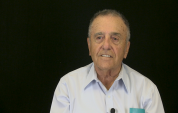5:31 | There were some things that Andy Negra saw in the war that really made him stop and think. German soldiers who were using horses to pull their artillery, both dead along the road. Newly liberated French villagers shearing the hair of a collaborator. These were only two of the striking images and experiences that stuck with him.
Keywords : Andy Negra France French collaborator Germany German civilians Brest horses Avranches Tintling cow 240 mm howitzer M1

A couple of weeks after Andy Negra graduated high school in 1943, he was on his way to Fort Bragg. The first sergeant he encountered told him he no longer had a name. He was now a number.
When the field artillery unit got to England, they were camped next to a British women's anti-aircraft unit. Andy Negra was taking a helmet bath one day when the alarm went off and his bath became a shower. They crossed the Channel eighteen days after D-Day to join the war and headed toward Brest.
Andy Negra was with a field artillery battalion that was sent by Patton to subdue the Germans on the Brest peninsula. He was rotated through several jobs in the armored outfit during what became a mission of containment.
He might dig three foxholes in one day. Andy Negra's field artillery unit was moving so fast, he would have to leave his newly dug hole and hit the road again. He got an amazing Christmas dinner when he reached Metz, then was sent to help at Bastogne.
Andy Negra has some memories that really stuck with him from the war, not combat but odd little things that he saw. In Frankfurt, he liberated some German banners and some schnapps. He passed Buchenwald and wound up on one side of a river with Soviet troops on the other.
He was lacking in points, having been drafted in 1943, so Andy Negra had to stay on in postwar Germany for a while. Finally he was allowed to return and he immediately went looking for the girl he met just before he deployed.
The American fighting man came home after World War II and just wanted to be left alone, according to Andy Negra, who had fought his way across France and Germany in a field artillery outfit. They were just young kids who went and did a job that started on that fateful day in December of 1941.